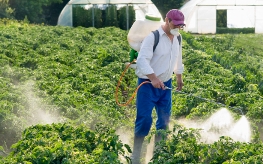Pesticides in Water
How to Minimize Exposure
by Merlin Hearn
Note: As an Amazon Associate I earn from qualifying purchases.
The cumulative effect of pesticides in water we drink and the food we eat should concern everyone.
Have you ever tasted lettuce that has a metallic, bitter taste to it?
Have you ever soaked your veggies in water and the color of the water turned dark yellow or orange?
It’s not a pleasant thought, but both are signs that you’re ingesting pesticides.
Even if you haven’t noticed these signs, chances are high that you are consuming invisible pesticides in water and food.
Farmers are using more and more pesticides to protect their crops from pesky insects and weeds. How does this affect us?
These pesticides are toxic chemicals that are meant to kill off insects, rodents, weeds, and fungi. They are entering our bodies through the food we eat and any unfiltered water we drink.
Americans alone use over 75 million pounds of pesticides, and scientists are just starting to determine the effect of these pesticides on our bodies in the long-term as well as the short-term.
Pesticides in Water: 3 Classes to Consider
There are three main classes of pesticides to watch out for are insecticides, herbicides, and fungicides.
Insecticides target the insects, herbicides the weeds, and fungicides are designed to kill any type of fungus or bacteria at the microscopic level that can directly affect the plants.
1. Insecticides
Insecticides are the most dangerous of the pesticides to humans as well as mammals. They attack small insects that would like to eat on the farmer’s crop and ruin an otherwise good fruit or veggie.
One of the most important qualities that a farm looks for in an insecticide is persistence. An insecticide that can stay on the plant for a long duration is optimal.
The longer the life of the pesticide, however, the more chance it has of becoming ingested by humans or running off into the water, harming and killing the marine life.
2. Herbicides
Herbicides are substances that cause disruption or stoppage of normal plant growth. They are usually selective, meaning that they target certain types of plants, but they can also be non-selective, harming any plant that they are sprayed onto.
This type of pesticide is generally not considered harmful to humans since it affects the inherent plant processes to plants, not mammals or insects. They can, however, affect the soil and quality of the crop the longer they persist.
3. Fungicides
Fungicides are the most widely used pesticide and are also used in industrial production as well as home use. They cut across three of the five biological kingdoms and affect a wide variety of microscopic organisms.
Some fungicides are more harmful than others and can have a negative effect on our bodies, especially if a large amount is ingested over time or in one sitting.
What Farmers Can Do to Reduce Pesticides
Farmers have a huge responsibility when it comes to pesticide pollution.
Just a few of the key recommendations to reduce exposure include the following:
- Use non-toxic, natural pesticides whenever possible
- Use pesticides and fertilizers which have less potential for runoff and a shorter half-life
- Spray plants when it is less windy, minimizing the affected area
- Store harmful pesticides away from water sources.
How to Minimize Your Exposure to
Pesticides in Water
In addition to what farmers can do better, there are things we all can do to protect ourselves and our families from the negative health effects of cumulative ingestion of chemical pesticides in water and food.
- If you have a garden, educate yourself on the many benefits of organic gardening and the use of natural pesticides and/or other non-toxic products for your lawn and garden.
- Store any chemical pesticides you do use for your lawn or garden away from water sources.
- Buy organic food whenever possible and wash your organic produce with filtered water and a natural produce wash that kills bacteria.
- When buying commercial produce, use a produce wash solution that also removes chemical-based pesticides and insecticides. Simply washing commercially grown produce with plain water or an anti-bacterial produce wash will not remove the oil-based chemical pesticides..
- Avoid drinking unfiltered tap water, well water, or bottled water. Filtered drinking water is the safest and healthiest choice.
Further reading . . .
Five Ways to Reduce Your Exposure to Endocrine Disrupting Chemicals
Return from Pesticides in Water to Water Contaminants
If you would like to reproduce or republish this article or any other article on this site, feel free to do so but please include a reference or link to the article at WaterBenefitsHealth.com.
Sign Up for Our Monthly
Newsletter
Visitor Comments
"This was the best and most straight forward info on the net yet. I asked a question and got an answer that made sense. Thank you so much!" - Linderlinder
FINALLY!!! I have been wondering about this for years with no 'solid' answer. This is exactly what I've been wanting to know! Thank you for this share..." by Andy
"Thank you for the information, Nancy. I appreciate it. Your article and findings are very helpful, referring to dehydration." - Carolyn
"Lemon water is one drink both my wife and I can't drink. It upsets our stomachs. We are in our sixties and in very good health—well, better health now that we drink about 2 liters plus of water each day. It has made so much difference to our digestive systems and recovery every day. Thank you for your website and effort." - Rod



